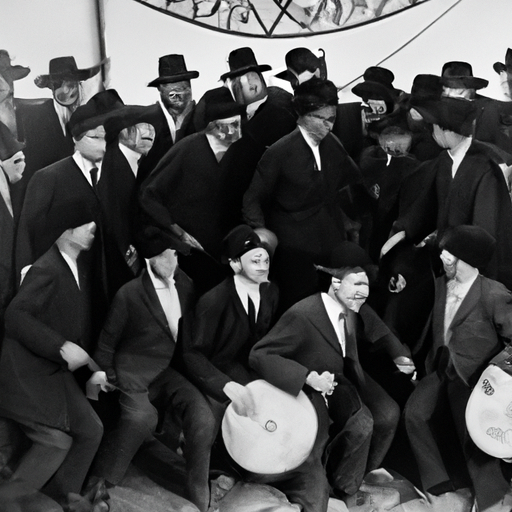In this blog post, we take a journey through the rich and diverse history of Israeli music. From traditional folk songs to the modern pop and rock, Israeli music is a melting pot of cultures and influences that reflect its unique history. We will delve into the roots of this vibrant music scene, exploring its evolution and the artists who have shaped it.
1. The Melodies of the Past: What is the origin of Israeli music?
Israeli music is a vibrant tapestry woven with threads of diverse cultural influences that reflect the rich history of the region. The roots of Israeli music can be traced back to ancient times, blending traditional Jewish melodies with the sounds of the Middle East. From the haunting tunes of Sephardic Jews to the lively rhythms of Mizrahi music, Israeli music encompasses a wide range of styles and genres. The early pioneers of Israeli music drew inspiration from biblical psalms and folk songs, infusing them with a contemporary twist. Over the years, Israeli music has evolved and adapted, incorporating elements from various immigrant communities who have made Israel their home.
The revival of Hebrew as a spoken language in the early 20th century played a significant role in shaping Israeli music, as it provided a common linguistic foundation for songwriters and musicians to express themselves. Israeli music often reflects the turbulent history of the region, with themes of longing for peace, love, and homeland woven into its lyrics. The pioneering efforts of iconic artists such as Naomi Shemer, Arik Einstein, and Ofra Haza have helped define the sound of Israeli music and establish its place on the global stage. Today, Israeli music continues to thrive, with a new generation of artists drawing inspiration from the past while pushing boundaries and experimenting with innovative sounds.

1. An old black and white photograph of a group of early Jewish immigrants dancing in a circle, playing traditional instruments.
2. ‘Music is the language of the spirit. It opens the secret of life bringing peace, abolishing strife.’ – Kahlil Gibran: The Impact of Israeli Music on Society
Israeli music holds a profound place in society, transcending mere entertainment to become a powerful force for unity, healing, and cultural expression. As Kahlil Gibran eloquently stated, “Music is the language of the spirit. It opens the secret of life bringing peace, abolishing strife.” These words encapsulate the transformative impact that Israeli music has had on society, serving as a unifying thread that connects people across divides. Through its melodies and lyrics, Israeli music has the ability to evoke deep emotions, provoke thought, and inspire action, making it a potent tool for social change and reflection.
The songs of Israel have played a crucial role in shaping the collective identity of the nation, reflecting the joys, struggles, and aspirations of its people. From the anthems of resilience during times of conflict to the ballads of love and longing, Israeli music serves as a mirror reflecting the complexities of society. It has the power to bring people together, fostering a sense of community and shared heritage that transcends differences. Israeli music has also served as a platform for artists to address pressing social issues, from calls for peace and coexistence to explorations of personal identity and belonging.
3. Breaking Boundaries: How did Israeli music evolve and fuse with global trends?
Israeli music has a rich history of evolution, characterized by its ability to seamlessly fuse traditional elements with modern influences from around the world. From its early roots in Jewish liturgical music and Middle Eastern melodies to the incorporation of Western instruments and genres, Israeli music has continuously adapted and transformed over the years. This evolution mirrors the diverse cultural tapestry of Israel itself, where influences from Europe, the Middle East, Africa, and beyond converge to create a unique musical landscape.
One of the key factors driving the evolution of Israeli music has been the influx of immigrants from different parts of the world, each bringing their own musical traditions and styles. This cultural exchange has led to a vibrant fusion of sounds, rhythms, and instruments, resulting in a rich tapestry of musical genres that reflect the diversity of Israeli society. From Yemenite folk songs to Russian klezmer tunes, Israeli music has absorbed and integrated a multitude of influences, creating a dynamic and eclectic sound that defies categorization.

3. A collage showing the evolution of Israeli music, featuring album covers from different decades, showcasing the fusion with global trends.
4. Singing the Future: Who are the emerging artists shaping the future of Israeli music?
As Israeli music continues to evolve and push boundaries, a new generation of talented artists is emerging, poised to shape the future of the country’s musical landscape. These emerging artists bring fresh perspectives, innovative sounds, and a willingness to experiment with different genres and styles. One such artist is Neta Barzilai, whose unique blend of pop, dance, and Middle Eastern influences captured international attention when she won the Eurovision Song Contest in 2018 with her song “Toy.” Barzilai’s success has not only propelled her to global stardom but has also paved the way for other Israeli artists to explore new musical territories and reach wider audiences.
Another rising star in the Israeli music scene is singer-songwriter Aviv Alush, known for his soulful vocals and introspective lyrics. Alush’s music blends elements of folk, indie, and electronic music, creating a sound that is both contemporary and deeply personal. With his heartfelt storytelling and emotional performances, Alush is redefining the boundaries of Israeli music and garnering a dedicated following both in Israel and abroad. These emerging artists, along with many others, represent the vanguard of Israeli music, challenging conventions, and shaping the future of the country’s musical identity. By embracing innovation, diversity, and a spirit of exploration, these artists are ensuring that the legacy of Israeli music continues to thrive and evolve in the years to come.
In conclusion, the history of Israeli music is a fascinating journey of cultural fusion and evolution. It is a testament to the nation’s resilience and creativity, reflecting its diverse cultural heritage and responding to its geopolitical realities. With the emergence of a new generation of artists, Israeli music continues to evolve, shaping and reflecting the nation’s narrative in the most melodious way.
